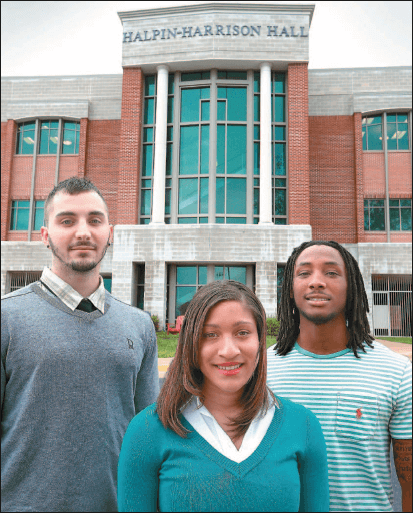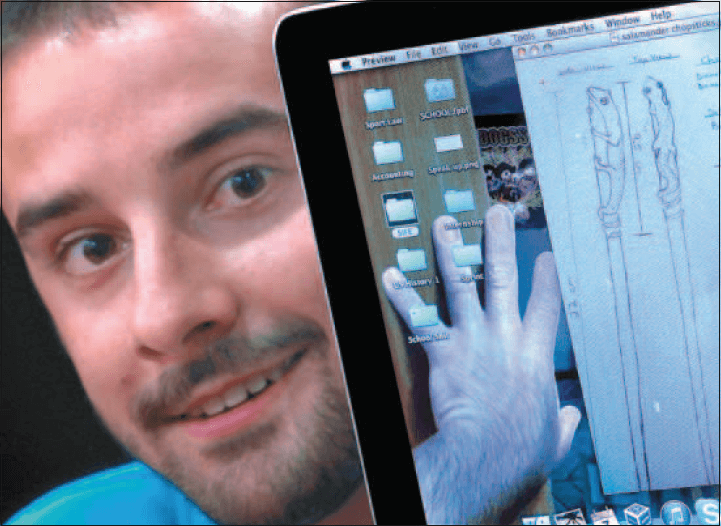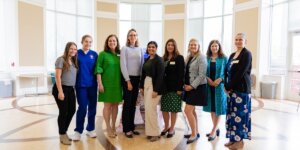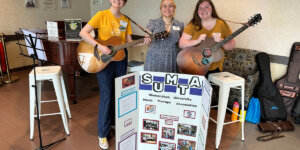Photo by JEFF TAYLOR/ The Winchester Star
Senior Jared Krampetz of Lacey Township, N.J., shows his alternative to wooden chopsticks on his laptop computer. The chopsticks are made of 100 percent biodegradable cornstarch and feature a salamander on the top to represent forest life affected by the felling of trees to make wooden chopsticks.
After more than three months of research on chopsticks, Shenandoah University senior Jared Krampetz might have found a way to help decrease deforestation.
During the weekend of April 26, SU’s Harry F. Byrd Jr. School of Business sent five teams of students to the 53rd annual Collegiate DECA International Career Development Conference in Washington, D.C. It was the first time the school participated at the national level of the competition.

Among the competitors from Shenandoah University at the 52nd DECA Collegiate Nationals last month in Washington, D.C., were senior Shane Tanzosh (from left) of Warwick, N.Y., senior DeShawna Kyle of Lynchburg; and junior Brandon Adams of Naruna. (Photo by Jeff Taylor/The Winchester Star)
Each team’s project started in the spring semester and consisted of completing a real-world consulting assignment for a nonprofit client. The students also found “greener” ways for the organizations to conduct business.
Business school associate professor Giles Jackson said the projects showed students that not everything is easy — people don’t call back, puzzle pieces need to be put together and many situations aren’t stable.
“Textbooks give you an artificial sense of security,” he said. “The real world is a lot messier.”
Krampetz’s project, which was the only one to place in the finals, sought more sustainable alternatives to traditional chopsticks.
Each year, the equivalent of 3.8 million trees go into the manufacture of about 57 billion disposable pairs of chopsticks in China, according to statistics from the national forest bureau.
These chopsticks are made from cotton wood, birch, spruce and bamboo trees.
Due to increased demand, forests are also being cleared in North America and Europe for the same product.
Krampetz chose to work with the nonprofit organization Chopsticks for Salamanders, which aims to end the clearing of hardwood forests for disposable chopsticks so as to protect amphibian habitats. The founder is Lauren Augustine, with the National Zoo in Washington, D.C.
After researching various suppliers in China, Krampetz found that one — a company called Ecota — made 100 percent biodegradable chopsticks from plant starch.
“I didn’t know anything about chopsticks before this,” he said. “This was really eye-opening.”
In the fall, Jackson’s marketing and communications class will develop marketing strategies and help raise funds for Chopsticks for Salamanders so that the nonprofit group can try to buy the Ecota product and market it.
Senior Shane Tanzosh and his team sought to help empower Haitian farmers and establish sustainable agriculture in the country by finding ways for farmers to export moringa to the U.S.
Moringa is a plant that is easy to grow and has a high nutrient content, but the Haitians have never cultivated it.
Through the project, students analyzed trade regulations and contacted manufacturers of organic products in the U.S. to educate them about the plant.
“I think it’s the first time we really applied everything we’ve learned to a real-world case,” Tanzosh said, adding that most college students don’t get that kind of experience while in school.
Junior Brandon Adams and his group analyzed the inefficiencies of the SNAP (Supplemental Nutrition Assistance Program) at Blue Ridge Area Food Bank and determined how they could make it better.
“I got experience dealing with an actual place,” Adams said. “We looked at the information, analyzed it and saw how it could get better.”
Senior DeShawna Kyle and her team researched how Winchester Medical Center’s Auxiliary Attic could better compete with its competitors and market itself. Through the project, the team charted competitors’ merchandise and sales.
“It’s a great experience,” she said. “You get to meet a lot of people.”
The Algernon Sydney Sullivan Foundation paid the registration fees of all students.
— Contact Rebecca Layne at rlayne@winchesterstar.com
By REBECCA LAYNE The Winchester Star
REPRINTED WITH PERMISSION OF The Winchester Star




